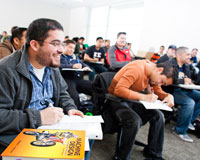
MERCED, Calif. — The University of California, Merced, will report at the White House today (Dec. 4) on progress the campus is making in its efforts to support undocumented students, create career pathways to the Silicon Valley and advance other initiatives to help underserved students prepare for and succeed in college.
Chancellor Dorothy Leland, who unveiled the six initiatives during the first College Opportunity Summit in January, will again join representatives from other colleges and universities, First Lady Michelle Obama and officials from the National Economic Policy Council and the Department of Education.
 “UC Merced is proud to be a part of this prestigious and vitally important effort, and we are even prouder of the steps we have taken as a university to serve our students more effectively,” Leland said. “Every student has his or her own strengths, circumstances and challenges, and our job is to ensure they all have the tools, knowledge and support they need to succeed.”
“UC Merced is proud to be a part of this prestigious and vitally important effort, and we are even prouder of the steps we have taken as a university to serve our students more effectively,” Leland said. “Every student has his or her own strengths, circumstances and challenges, and our job is to ensure they all have the tools, knowledge and support they need to succeed.”
At today’s summit, UC Merced will report on the progress that has been made toward each of the six initiatives Leland outlined in January:
- Undocumented Student Services: The university, which added 124 undocumented students in Fall 2014, began a “career boot camp” program to help students better navigate life after college. A $500,000 endowment from a local family foundation will support the campus’s efforts and provide scholarships for undocumented students.
- Silicon Valley Pathways Program: Student job and internship placement with companies in the Silicon Valley and Bay Area more than doubled from the previous year, from 90 to 191, and the number of Silicon Valley firms conducting on-campus interviews and information sessions for students increased from four to 17.
- STEM Resource Center: Additional funding from the campus has allowed the Science, Technology, Engineering and Math (STEM) Resource Center to enhance academic support — including peer tutoring, faculty mentoring and research opportunities for undergraduates — for the 49 percent of UC Merced students who major in those fields.
- College and Career Readiness Conference: UC Merced held this one-day conference in April to address college preparation, affordability and career exploration for 74 high school seniors from low-income families. The students, most of them bound for community college, attended career workshops in health, education, public service and engineering.
- Foster Youth Services: The Guardian Scholars Program at UC Merced, which provides support to the roughly 80 former foster youths on campus, now offers year-round housing and emergency funds for financial hardship. The program has also built alliances with community colleges and counties, launched early outreach programs for K-12 students, and supported college-readiness training programs for foster parents and social workers.
- Financial Literacy: In partnership with local financial institutions, UC Merced offered several “Money Wise” financial literacy workshops in 2014. The campus is also developing a financial literacy website.
For its second College Opportunity Summit, the White House is also looking for new commitments from colleges and universities to help underserved students.
The UC Merced School of Engineering is committing to a significant curriculum overhaul, with an increased focus on entrepreneurship and innovation to help improve student retention. The School of Natural Sciences will create a series of workshops to train underserved students in the fundamental skills required for scientific research, thus better preparing them to step into on- or off-campus internships.
And the university, which already has above-average retention and graduation rates among low-income and underserved students, will develop a comprehensive retention plan that will include specific short- and long-term goals for continued improvement.
UC Merced is well positioned to lead on issues related to underserved students, as 60 percent of its undergraduates are Pell grant recipients and 62 percent are first-generation students. The university’s Fiat Lux Scholars Program has provided assistance and support to 368 low-income students in its first two years, and the campus also offers free tutoring, a first-year success course, special academic workshops, and mid-semester grades for all first- and second-year students.






